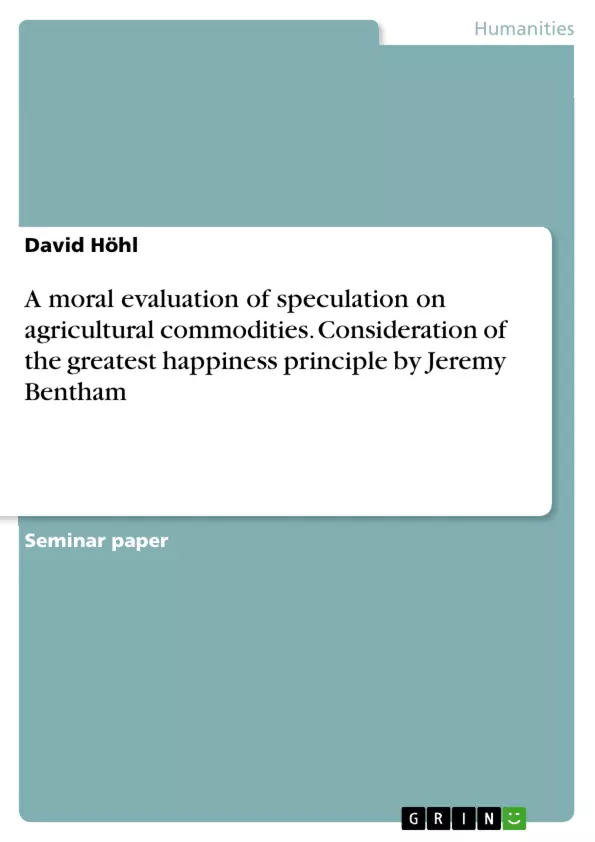Which consequences do the speculation on agricultural commodities have on food prices? Is it morally wrong to speculate on agricultural commodities? Are policy makers ethically obligated to regulate the speculation of agricultural commodities? The following paper will face these issues.
First of all, I will define the greatest happiness principle by Jeremy Bentham, agricultural commodities, commodity futures and futures markets as well as speculation. Afterwards, I will analyze the consequences of speculation on agricultural commodities for all concerned parties. Doing this, I will examine the effects of the speculation on commodity trading firms, banks, investors and the price development of agricultural commodities. On the basis of the results of my examination, I will apply the greatest happiness principle. Given this analysis, I will state my advice for policy makers.
Inhaltsverzeichnis (Table of Contents)
- Introduction
- Definitions
- Greatest Happiness Principle by Jeremy Bentham
- Agricultural Commodities
- Commodity Futures and the Futures Market
- Speculation
- Analyzing the Consequences of Speculation on Agricultural Commodities for all Concerned Parties
- Analyzing the Consequences of Speculation in Commodity Trading Firms
- Analyzing the Consequences of Speculation on Banks and Investors
- What impact does speculation have on the price development of agricultural commodities
- Application of the greatest happiness principle
- Advice for policy makers
- Conclusion
Zielsetzung und Themenschwerpunkte (Objectives and Key Themes)
This paper aims to provide a comprehensive analysis of the ethical implications of speculation in agricultural commodities using the utilitarian framework of Jeremy Bentham's Greatest Happiness Principle. It examines the effects of speculation on various stakeholders and ultimately seeks to provide recommendations for policymakers.
- The Greatest Happiness Principle as a framework for ethical analysis.
- The impact of speculation on agricultural commodity prices.
- The role of speculation in commodity trading firms, banks, and investors.
- The ethical considerations of speculation in relation to food security and social justice.
- Policy recommendations for mitigating the negative consequences of speculation.
Zusammenfassung der Kapitel (Chapter Summaries)
- Introduction: This chapter introduces the topic of speculation in agricultural commodities and outlines the paper's objective to analyze its ethical implications using the Greatest Happiness Principle.
- Definitions: This chapter provides essential definitions for key terms such as the Greatest Happiness Principle, agricultural commodities, commodity futures, and speculation. It clarifies the context and framework for the subsequent analysis.
- Analyzing the Consequences of Speculation on Agricultural Commodities for all Concerned Parties: This chapter delves into the impact of speculation on various stakeholders involved in the agricultural commodity markets. It examines the consequences for commodity trading firms, banks, investors, and ultimately, the price development of agricultural commodities.
- Application of the Greatest Happiness Principle: This chapter applies the principle to the analyzed consequences of speculation, evaluating whether it promotes overall happiness and well-being or results in negative outcomes for different groups.
Schlüsselwörter (Keywords)
This paper focuses on the ethical implications of speculation in agricultural commodities, drawing on the utilitarian framework of Jeremy Bentham's Greatest Happiness Principle. Key terms include agricultural commodities, commodity futures, speculation, food security, social justice, and policy implications.
Frequently Asked Questions
What is Bentham's "Greatest Happiness Principle" in this context?
It is a utilitarian framework used to evaluate whether speculation on agricultural commodities promotes the overall well-being and happiness of all concerned parties.
How does speculation affect the price of agricultural commodities?
The paper analyzes the consequences of speculation on price development and whether it leads to volatility or artificial price hikes that impact food security.
Who are the main stakeholders considered in this analysis?
The analysis examines the impact on commodity trading firms, banks, investors, and the general population affected by food prices.
Is it morally wrong to speculate on food?
The paper seeks to answer this by weighing the economic benefits for traders against the social costs for consumers using ethical principles.
What advice is given to policy makers regarding commodity markets?
Based on the moral evaluation, the author provides recommendations on whether and how governments should regulate speculation in these essential markets.
- Quote paper
- David Höhl (Author), 2018, A moral evaluation of speculation on agricultural commodities. Consideration of the greatest happiness principle by Jeremy Bentham, Munich, GRIN Verlag, https://www.grin.com/document/437159



